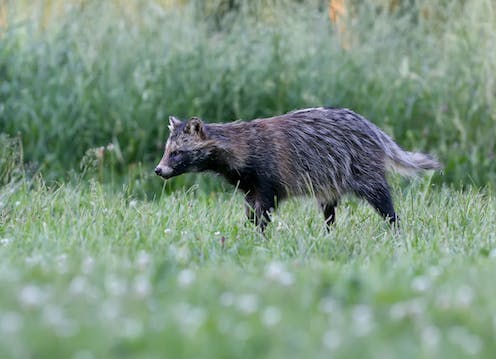
Voodison328/Shutterstock
The origin of SARS-CoV-2, the virus that causes COVID, has long been a topic of heated debate. While many believe SARS-CoV-2 spread to humans from an animal at Wuhan’s Huanan Wholesale Seafood Market, others have argued the virus was accidentally leaked from a lab at the Wuhan Institute of Virology.
Over the past week there has been intense activity surrounding the emergence of new data relevant to this question. In particular, reports emerged that the pandemic’s origins may be linked to raccoon dogs which were being sold illegally at the market.
The excitement stemmed from a re-analysis of raw data generated as part of official investigations into the role of the Huanan Wholesale Seafood Market in the outbreak.
The team of international scientists working on this re-analysis (from North America, Europe and Australia) alerted the World Health Organization and discussed the topic in an article published in The Atlantic. And the scientists themselves have now released a report on the issue, providing greater detail.
So what can we make of their findings? Will this development shift the course of the ongoing debate? Let’s take a look.
Table of Contents
The Huanan market
In January 2020, writing about the emergence of what we now call SARS-CoV-2, I stated the importance of understanding how this pandemic began. It remains important to determine the virus’s origins because this knowledge may help us stop the next pandemic occurring.
Even very early in 2020, it was clear that the central Chinese city of Wuhan (a major metropolis and travel hub) was the epicentre of the outbreak. Within Wuhan, the Huanan seafood market stood out as it was associated with many – but not all – of the earliest cases. Indeed, the market was closed on January 1 2020, animals were culled, and the site was disinfected.
Suspicions arose given the role that animal trade and markets had played in the emergence of the closely related SARS-CoV-1 virus (which caused SARS, a widespread outbreak of viral respiratory disease) nearly two decades earlier. Evidence emerged that the Huanan seafood market also sold live mammals, including a fox-like mammal known as a raccoon dog, that we now know are susceptible to SARS-CoV-2.
Later epidemiological and genetic analyses further focused in on the market, and even specific stalls within it, as being the origin of the pandemic.
Read more:
The original Sars virus disappeared – here’s why coronavirus won’t do the same
The new data
As part of the official investigations into the market, swabs were collected from various parts of the market in the two months after it shut down at the start of 2020. The scientists who undertook this research, from the Chinese Center for Disease Control and Prevention, posted their analysis as a pre-print (a study yet to be peer-reviewed) in February 2022.
In this, the team concluded that the market likely played a significant role in SARS-CoV-2’s early spread, but that they couldn’t detect the virus in samples taken directly from animals. They reported that all the virus evidence found was associated with humans, and it was therefore likely the virus had been brought into the market by humans, not animals, and so perhaps the pandemic began elsewhere.

Kateryna Kon/Shutterstock
However, prior to any official peer-reviewed publication, the raw data from this work was released on an open scientific database called Gisaid. And the group of scientists who re-analysed this data did actually find an association between SARS-CoV-2 and animals, in particular raccoon dogs in the market.
They found DNA from animals mixed in with SARS-CoV-2 in a number of samples from the market. Some positive samples contained no human DNA and mostly raccoon dog DNA. This mix of virus and animal material is consistent with an infected animal – not a human – shedding virus, which is what you might expect if SARS-CoV-2 originated from animals brought into the market. Unfortunately, samples from a living raccoon dog were either not taken or not reported, and the official investigation makes no mention of raccoon dogs.
Where to from here?
While this latest data is one additional piece of the puzzle that supports an origin of the pandemic linked to Wuhan’s animal trade, it is unlikely to provide irrefutable evidence. It’s important to note it’s also a pre-print.
Ideally, we would like animal samples from early December 2019, and to compare animal virus genomes with human ones. It will also be crucial to follow events backwards through the animal trade and farming systems to work out where the animals got the virus from in the first instance.
Further, we must bear in mind that the virus could have easily been given to a raccoon dog by an infected human, or that the association between raccoon dog DNA and SARS-CoV-2 may be coincidental.
Read more:
We want to know where COVID came from. But it’s too soon to expect miracles
However, evidence is accumulating that official investigations have left a gap in their research – particularly around the role that animals like raccoon dogs and the wildlife trade played in the origins of the pandemic.
While it may be unlikely that we will ever get concrete evidence as to how SARS-CoV-2 entered the human population, we can still think pragmatically and seek to alter behaviour and practices to reduce the chance of a new pandemic. One immediate target would be food systems (encompassing farm to fork), and how to make farming and the wildlife trade safer for all, potentially by enhancing virus surveillance in animals.
![]()
Connor Bamford receives funding from Wellcome Trust, UKRI, SFI and BMA Foundation.























